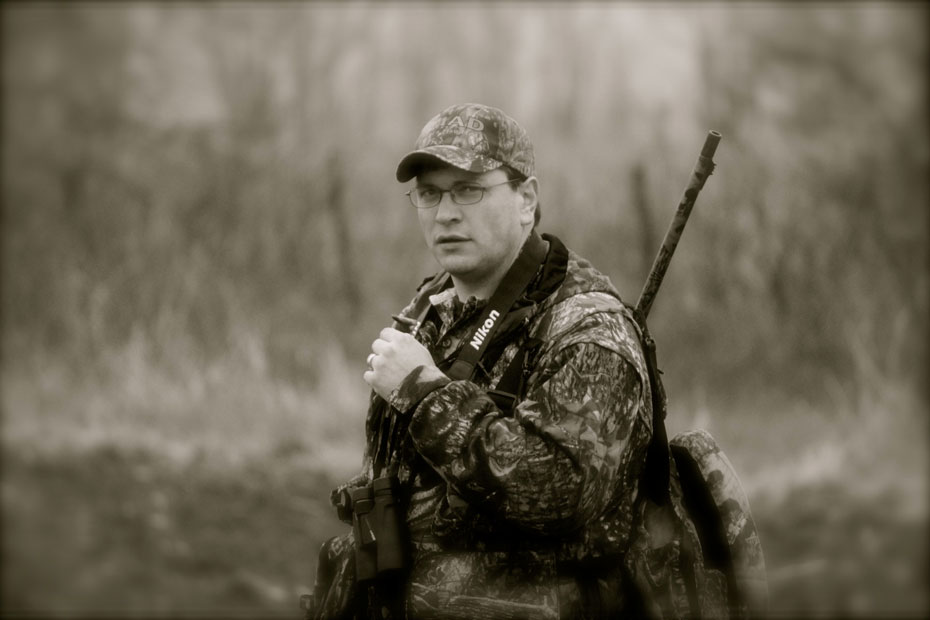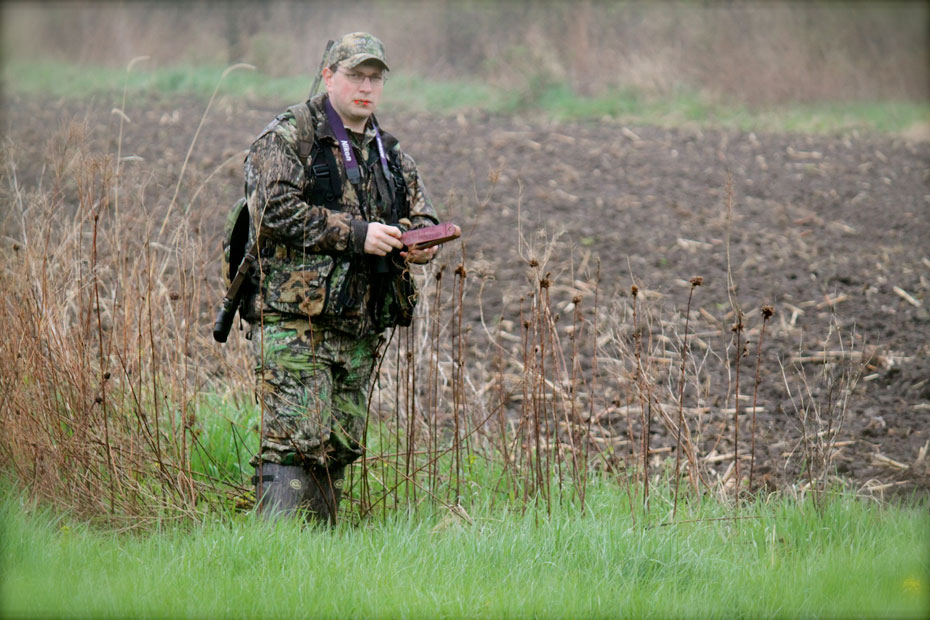Matt Van Cise from Brookville, Pennsylvania, is known as one of the nation’s leading turkey callers, and his resume proves it. He's been hunting turkeys for 27 years, and he's been competing in turkey calling contests for 23 years. He's won seven World Open Championships, five Senior Grand Nationals, two Grand National Friction Calling Championships, a World Friction Championship, three U.S. Opens, the Mid-American Open and the North American Open. If you include all the smaller calling contests, he's probably won over 100. A Mossy Oak ProStaffer since 2011, Van Cise’s two favorite Mossy Oak patterns for turkey hunting are Mossy Oak Obsession and Bottomland. He recently won the 2018 National Wild Turkey Federation (NWTF) Grand National Friction Calling Contest.
Matt Van Cise | Mossy Oak ProStaff

I've been used many different materials and types of turkey calls, but I haven’t begun to master suction-type calls (wingbone calls and tube calls). However, any type of device, wood or other material that I can use to make turkey sounds really intrigues me. When it comes to friction calls, I just really enjoy making them and speaking to the turkey on these types of calls.
In past years, a master turkey caller would sit down with a beginning turkey caller and show him how to use the friction call. But today, YouTube and Facebook have so many instructional videos, it’s much easier to learn to use any turkey call than it ever has been in the past. I hate to encourage beginners to learn to call from another turkey call manufacturer’s videos. However, the World Wide Web has so many good videos. Anyone can go to the web and see a master turkey caller teach how to use any type turkey call. But the only way to be a consistent turkey caller is to look at and listen to live wild turkeys - both gobblers and hens - making the sounds that they make.
Today, you can watch YouTube videos, CDs, DVDs and Blue Rays and actually listen to real, live turkeys calling. Then you can try to imitate that same call with a friction call or any other type turkey call you want to learn to master.
Everyone gets excited about learning to call turkeys better, and all my life I've been a student of turkey calling. But it’s just as important to know when NOT to call turkeys. If you call to a turkey when he doesn’t want to hear your call, you'll do more to keep him away from you than you'll do to bring him to you. Each gobbler is different and responds to various calls in different ways. A turkey gobbler doesn’t know what he's supposed to do when he hears a certain sound but makes a decision of whether to gobble or not based on his mood and his surroundings. He may gobble to one particular call one day and not answer that call three days later.
For instance, rainy day turkeys act differently than gobblers do on a bluebird day. On rainy days, turkeys don’t gobble very much. For sure, they don’t gobble as much as they do on bluebird days. If you're lucky enough to hear a turkey gobble on a rainy day, the next step is to try and determine what type of hen or gobbler call that turkey wants to hear and will come to on that day. For instance, if I called to a tom on a rainy day, and he cuts my call off (gobbles before I finish my calling sequence), I know he likes the calls I'm giving him. So, I’ll use those calls to bring him into gun range. But if I call to him and he gobbles back to my call, and I call to him again and he doesn’t gobble back to me, I’ll back off my calling and wait. Then I may use a different type of call or a sequence of calls until I can discover the kind of call he wants to hear and the sequence of calls that will keep him gobbling.
If you're hunting public-hunting areas, you know that turkey hunters are in and out of those woods every day of turkey season. The majority of those turkey hunters will be running and gunning (calling from one spot, waiting two or three minutes, and if they don’t hear a turkey, gobble, they move to another place and call from there). Turkey hunters on public land usually call too loudly and too much. But if a successful turkey hunter hears a turkey gobble, he will try to get in as close to the gobbler as possible without spooking the gobbler. Then he’ll call as little as possible. He’ll depend on his patience more than his calling ability to bag that gobbler. All that successful public-land turkey hunter wants to do is let the gobbler know that a hen is close to him, and then wait to see if that gobbler is coming to him or not. Oftentimes on public land, less calling equals more turkeys taken.
I’ve mentioned hunting turkeys in the rain. I've been to a lot of turkey camps and awakened to pouring-down rain, and the other turkey hunters would sit in camp and say, “The turkeys aren’t going to gobble today, because it’s raining so hard. So, I'm just going to wait until the rain stops before I leave camp.” But turkey season is so short that I try to hunt every day of the season, rain or shine. I know that anytime I'm in camp or at the house, I'm not going to take a gobbler.
If I had to pick a day to hunt, especially in Pennsylvania where I live, I’ll want a clear, cool, crisp bluebird morning with a high-pressure system. This is the kind of day when I hear the most turkeys gobble. But I know I can’t dictate what the weather will be during turkey season. So, I have to be out there every day if I want to take a tom.
My tactics for taking turkeys don’t really change much on rainy days from what I do on clear days. To call turkeys on a rainy day, I usually use a diaphragm call. If you're using a friction call, you need to have a waterproof box or a pot call with a waterproof striker. So, on those days, I just prefer to use a diaphragm call. I usually use a three or four-reed diaphragm call, because I can get louder on those multiple reed calls than I can on a single or double reed call. Calling louder will cut through the noise made by the wind and rain better than calling softer. Because the noise of the rain and wind severely will limit how far you can hear a turkey gobble, I cover more ground on rainy days than I do on bluebird days.
Every day of turkey hunting is usually different from every other day of turkey hunting. So, when I go into the woods, I don’t have a set program of what I'll do if I hear a turkey gobble. I don’t know for sure what call I'll use, because just about every gobbler wants to hear something a little bit different from the other gobblers in his neighborhood. That’s why you always keep an assortment of calls in your turkey vest. Turkey vests these days come with lots of pockets that are easily accessible. There are some really nice turkey vests available this season.
To see and learn more about the custom calls that Van Cise is making, go to his Facebook page at High Class Calls by Matt Van Cise, or you can go to his personal Facebook page Matt Van Cise.



























